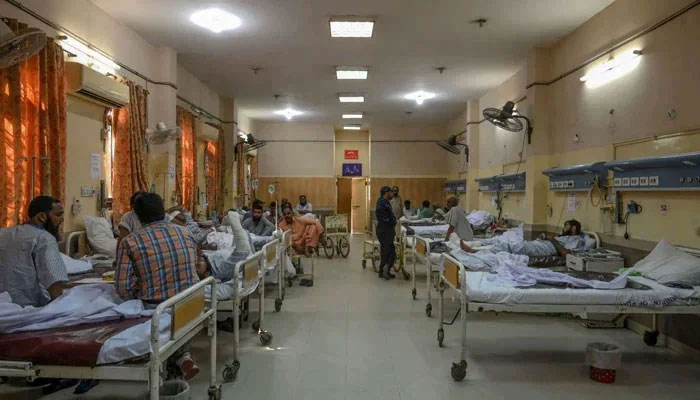Patients with ulcer, acidity or dyspepsia need proper check-ups during Ramazan
Rawalpindi:Patients suffering from stomach related diseases including stomach related acidity, dyspepsia or stomach ulcer should undergo medical check-ups on regular basis while fasting in the holy month of Ramazan as according to health experts, there may be chances of complications among them particularly after the middle of Ramazan.
Experts suggest that the chronic patients suffering from stomach ulcer must undergo complete medical check-ups at least once before and once during fasting in the month of Ramazan for diagnosis of ulcer’s complications. It is commonly observed that the majority of ulcer patients may face complications including recurrence of the disease and ulcer bleeding particularly after the middle of Ramazan.
It is worth mentioning here that Professor of Medicine Dr. Muhammad Shoaib Shafi who is President College of Physicians and Surgeons Pakistan had conducted a research on complications of ulcer during fasting with the help of surgeons. During the research, it was found that patients with severe ulcer when fasting without taking effective medications had to undergo complications like bleeding, pyloric obstruction and or perforation of ulcer.
It was also found that in most of the severe cases of ulcer, complications in a fasting patient normally occur after the 20th of Ramazan. The research also revealed that the chance of bleeding in a smoker patient of ulcer during Ramazan is 100 times greater than that of a non-smoker. Professor Shafi believes that all patients having complaints of ulcer should completely avoid smoking during Ramazan, instead they should use plenty of fruits and lemon during the month of Ramazan if fasting.
Studies reveal that stomach ulcer (also called a peptic ulcer) is small erosion (hole) in the gastrointestinal tract. The direct cause of peptic ulcers is destruction of the gastric or intestinal mucosal lining of the stomach by hydrochloric acid, an acid normally present in the digestive juices of the stomach. Excess secretion of hydrochloric acid, genetic predisposition, and psychological stress are important contributing factors in the formation and worsening of duodenal ulcers.
Another major cause of ulcers is the chronic use of anti-inflammatory medications, such as aspirin whereas cigarette smoking is also an important cause of ulcer formation and ulcer treatment failure. Stomach ulcer affects the nerves surrounding it. The nerves become agitated and cause a great amount of pain. In a good number of fasting patients, the stomach ulcers can cause haemorrhages from the erosion of a major blood vessel, a tear in the wall of the stomach or obstruction of the gastrointestinal tract because of spasm or swelling in the area of the ulcer.
Health experts believe that ulcers may develop serious complications including haemorrhages in a fasting patient if he or she does not take extra care in diet and medication. The patients with severe ulcers while opting for fasting for more than 12 hours a day should consult their physicians as they may need a change in schedule of their medicines to avoid complications. Experts also advise that every ulcer patient must undergo medical check-ups at least twice during Ramazan.
Experts say that with the help of proper medication, the effects of fasting on an ulcer patient can be minimized and complications can be avoided in a number of cases. Patients with stomach related diseases including stomach related acidity, dyspepsia or stomach ulcer should avoid oily foods while fasting and if they still feel that they have symptoms of ulcer, they should consult a qualified physician before continuing fasting. In patients with ulcerative symptoms, acidity may shoot due to fasting and the patients may suffer ulcer pains. Also among patients with severe ulcer, fasting may cause upper GI (gastrointestinal) bleeding that can be dangerous particularly in elderly patients.
-
 2026 Winter Olympics Men Figure Skating: Malinin Eyes Quadruple Axel, After Banned Backflip
2026 Winter Olympics Men Figure Skating: Malinin Eyes Quadruple Axel, After Banned Backflip -
 Meghan Markle Rallies Behind Brooklyn Beckham Amid Explosive Family Drama
Meghan Markle Rallies Behind Brooklyn Beckham Amid Explosive Family Drama -
 Scientists Find Strange Solar System That Breaks Planet Formation Rules
Scientists Find Strange Solar System That Breaks Planet Formation Rules -
 Backstreet Boys Voice Desire To Headline 2027's Super Bowl Halftime Show
Backstreet Boys Voice Desire To Headline 2027's Super Bowl Halftime Show -
 OpenAI Accuses China’s DeepSeek Of Replicating US Models To Train Its AI
OpenAI Accuses China’s DeepSeek Of Replicating US Models To Train Its AI -
 Woman Calls Press ‘vultures’ Outside Nancy Guthrie’s Home After Tense Standoff
Woman Calls Press ‘vultures’ Outside Nancy Guthrie’s Home After Tense Standoff -
 Allison Holker Gets Engaged To Adam Edmunds After Two Years Of Dating
Allison Holker Gets Engaged To Adam Edmunds After Two Years Of Dating -
 Prince William Prioritises Monarchy’s Future Over Family Ties In Andrew Crisis
Prince William Prioritises Monarchy’s Future Over Family Ties In Andrew Crisis -
 Timothée Chalamet Turns Head On The 'show With Good Lighting'
Timothée Chalamet Turns Head On The 'show With Good Lighting' -
 Bucks Vs Thunder: Nikola Topic Makes NBA Debut As Milwaukee Wins Big
Bucks Vs Thunder: Nikola Topic Makes NBA Debut As Milwaukee Wins Big -
 King Charles Breaks 'never Complain, Never Explain' Rule Over Andrew's £12 Million Problem
King Charles Breaks 'never Complain, Never Explain' Rule Over Andrew's £12 Million Problem -
 Casey Wasserman To Remain LA Olympics Chair Despite Ghislaine Maxwell Ties
Casey Wasserman To Remain LA Olympics Chair Despite Ghislaine Maxwell Ties -
 Shaun White Is Back At The Olympics But Not Competing: Here’s Why
Shaun White Is Back At The Olympics But Not Competing: Here’s Why -
 Breezy Johnson Engaged At Olympics After Emotional Finish Line Proposal
Breezy Johnson Engaged At Olympics After Emotional Finish Line Proposal -
 King Charles Wants Andrew To 'draw A Line' Under Epstein Issue
King Charles Wants Andrew To 'draw A Line' Under Epstein Issue -
 John Wick Game Confirmed With Keanu Reeves And Lionsgate Collaboration
John Wick Game Confirmed With Keanu Reeves And Lionsgate Collaboration




